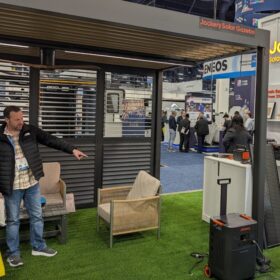Pirates of the PV industry
Product piracy is a well-known threat in many industries, and in solar the risk posed by poor quality products from disreputable manufacturers making their way onto rooftops and other PV installations should not be underestimated. With manufacturers investing in solutions to protect against inferior products bearing their logo, pv magazine looks at the size of the problem.
Volkswagen invests up to $200 million in stealthy solid-state battery builder QuantumScape
This investment comes on top of the $100 million invested in 2018. Venture capital and corporate funding of new energy technologies continues despite — or perhaps because of — the pandemic.
Vivint Solar joins EnergyHub in expanding PV and storage demand response programs
Can programs like EnergyHub and National Grid’s battery-powered DR turn utilities into residential solar fans?
Advanced macro grid initiative announced, with funding support from Bill Gates-backed group
Bill Gates and Breakthrough Energy see enhanced transmission as facilitating electrification and grid reliability. Increasing transmission development at the “seams” between regions could save consumers more than $47 billion and return more than $2.50 on every dollar invested.
Earth’s magnetic field affecting PV panel performance
Researchers in Kenya say the geomagnetic field could reduce solar panel conversion efficiency 0.21% between the equator and a 50-degree latitude. Their analysis showed the complex magnetic field can determine increases in module fill factor and falls in maximum power.
Solar hosting capacity maps must be accurate to be useful
Solar hosting capacity maps, now required in seven states, show where solar can be added on a distribution circuit without incurring any grid expense—but only if those maps are accurate. California’s experience, says a policy paper, shows that best practice guidelines for validating maps are needed to aid state regulators.
Keeping net energy metering credits ‘clean’ in California means adding relays and meters
It’s during the interconnection review and approval processes that most developers run into the NEM integrity issue with California’s big utilities.
Analyst expects ‘unprecedented’ consolidation of Chinese solar industry
Private PV manufacturers and project developers alike are set to be squeezed out by the state in the world’s biggest solar market, according to Frank Haugwitz, who has compiled a wide-ranging report as preparations for the next five-year plan gather pace.
Clipsal solar looks to deliver the world’s most customizable energy management platform
Developed to meet the needs of a rapidly-growing distributed energy market and backed by some of the biggest names in the Australian market, the team at Clipsal Solar has developed a platform they say can work with any combination of hardware and resources.
Updated: A roundup of venture capital funding in clean energy
Batteries have won the lion’s share of recent cleantech venture capital — but here are some recent funding rounds for fusion, graphene, electrical panels, circuit breakers, geothermal drilling and direct-air capture of CO2.















